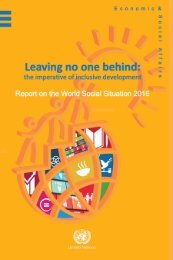Migrant Smuggling Data and Research
zgw9fv2
zgw9fv2
You also want an ePaper? Increase the reach of your titles
YUMPU automatically turns print PDFs into web optimized ePapers that Google loves.
In destination countries, migrant smugglers from Bangladesh, India,<br />
Pakistan <strong>and</strong> Sri Lanka, are largely depicted as criminals with some accused<br />
of abuse <strong>and</strong> starving their captives by the media, politicians <strong>and</strong> academia<br />
(Chowdhury, 2015; Shepherd, 2014; UNHCR, IOM <strong>and</strong> UNODC, 2015). This<br />
depiction is echoed by those in transit countries, <strong>and</strong> highlighted in graphic detail<br />
by the Rohingya from Bangladesh whose mass graves were found in Thail<strong>and</strong><br />
(Barry, 2015). Yet, in source countries, those involved in the smuggling process<br />
are not necessarily considered exploitative, but sometimes considered as heroes,<br />
helping people escape their difficult situations (Raghavan <strong>and</strong> Jayasuriya, 2016a,<br />
2016b). Many smugglers rely on their reputations, <strong>and</strong> so successful ventures<br />
generate more business for them.<br />
The apparent contradiction in conceptualizations of smugglers could<br />
in part be due to where smugglers (or those in the smuggling business) are<br />
interviewed. Initially, in source countries – presumably those respondents who<br />
are planning on undertaking irregular migration with the assistance of a migrant<br />
smuggler have not experienced the hardships in transit – may not fully appreciate<br />
the risks of transit, or may have been informed by their networks that the risks<br />
are worth taking. If these people are engaging migrant smugglers, they may<br />
do so with an underlying level of trust, <strong>and</strong> hence have positive views towards<br />
smugglers. A smuggler may also be part of a chain of smugglers, <strong>and</strong> actually be<br />
more of recruiter or facilitator rather than the main smuggler (Raghavan <strong>and</strong><br />
Jayasuriya, 2016a, 2016b). Conversely, those who have undertaken the journey<br />
<strong>and</strong> experienced hardships may have a different view of migrant smugglers.<br />
This conceptualization may also be different depending on the source country<br />
in question; Rohingya who languish in camps in Thail<strong>and</strong> before their family<br />
members can buy their freedom may or may not face different levels <strong>and</strong> types<br />
of abuse at the h<strong>and</strong>s of smugglers (<strong>and</strong> traffickers) compared with Sri Lankans<br />
who entered Australia irregularly in 2011 <strong>and</strong> 2012. Such examples often blur<br />
the difference between trafficking <strong>and</strong> migrant smuggling.<br />
In source <strong>and</strong> destination countries, irregular migrants who are seeking<br />
asylum have been conceptualized by some as opportunistic, queue jumpers <strong>and</strong><br />
driven by economic factors, while others present them as legitimate sufferers of<br />
human rights abuse <strong>and</strong> persecution (Howie, 2014). For governments in source<br />
countries protecting their human rights records <strong>and</strong> reputation, <strong>and</strong> governments<br />
in destination countries trying to limit the flows of irregular asylum seekers, the<br />
narrative seems to be the former. For human rights advocates, family members<br />
of asylum seekers <strong>and</strong> some sections of the asylum seeker’s communities, the<br />
latter conceptualization may be more accurate. Academia, to an extent, exists in<br />
the middle; showing irregular migrants may have both economic <strong>and</strong> protection<br />
reasons for migration (Dimitriadi, 2013; European Commission, Directorate<br />
188<br />
8. South Asia
















